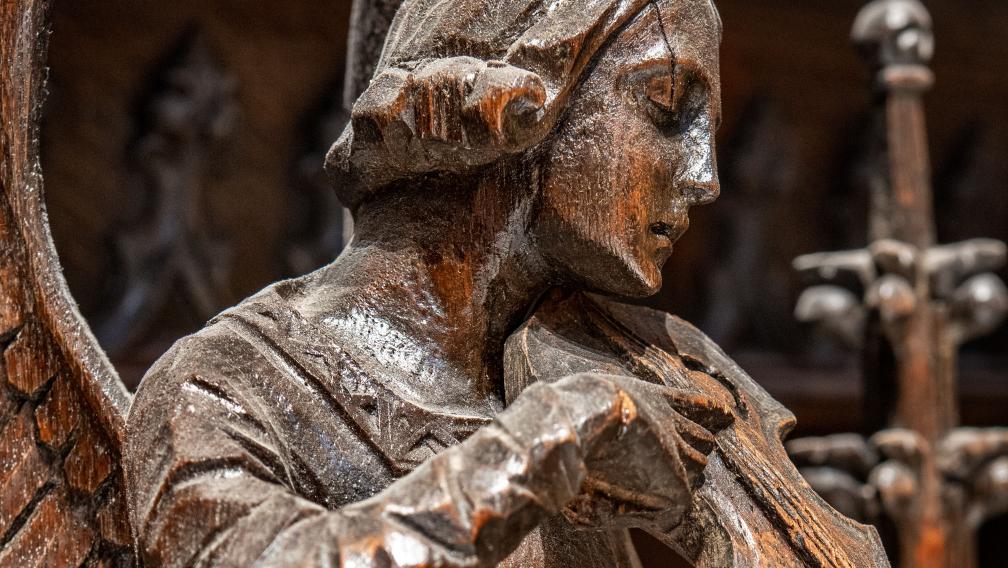LUKE 6:20–26
Blessed are you who are poor,
for yours is the kingdom of God.
Blessed are you who are hungry now,
for you will be filled.
Blessed are you who weep now,
because you will laugh.
Blessed are you when people hate you,
and when they exclude, revile you, and defame you
on account of the Son of Man.
Rejoice in that day and leap for joy,
for surely your reward is great in heaven;
for that is what their ancestors did to the prophets.
But woe to you who are rich,
for you have received your consolation.
Woe to you who are full now,
for you will be hungry.
Woe to you who are laughing now,
for you will mourn and weep.
Woe to you when all speak well of you,
for that is what their ancestors did to the false prophets.
In the Sermon on the Plain, Jesus instructs a crowd of followers who have come to him for his teaching and healing. The plain (or level place) in Luke’s Gospel suggests a setting in which Jesus meets ordinary people — and ordinary people encounter God. Biblical scholars regard the Sermon on the Plain, with its list of blessings and warnings, to be a compilation of Jesus’ most distinctive teachings. Writing to Gentile Christians, Luke emphasizes Jesus’ focus on the poor, oppressed, and marginalized of his time — those typically ignored and rejected.
Jesus’ instructions reveal a radically new understanding of God’s dream for humanity; power, status, riches, joy, success, and prosperity do not necessarily signify blessing. Instead, “God has exalted the humble.” (See Mary’s Magnificat.) Blessings upon the marginalized and woes upon the comfortable challenged the status quo. In Jesus’ instructions, we glimpse God’s infinite love and preferential option for the poor; God promises a reversal of the unjust conditions of their daily survival. The woes should not be understood as condemnations so much as warnings or challenges to the arrogant, comfortable, or self-sufficient. Disciples of Jesus are called to live in right relationship with God and to respond to those in need. We follow Jesus in our active dismantling of economic injustice, racial injustice, and all oppression, on behalf of the poor, the least, and the lost.
—Dr. Kathy Bozzuti-Jones
The Five Ways
SOCIAL JUSTICE
Writer and activist Alice Walker penned a set of beatitudes using an intriguing form, “Helped are those…” Hers is a broad vision that addresses racism, peacemaking, creation care, sexual orientation, and more.
In the Spiritual Exercises of St. Ignatius, he emphasizes God’s partiality towards the suffering people of this world while warning the self-sufficient of the reversal of fortune that awaits them.
PRAYER
Who wants to be poorer, sad, in conflict, excluded, or demeaned? Thoughts and questions for reflection on Luke 6:20–26 from the Irish Jesuits.
You can practice the Beatitudes Examen as you review your day and prepare for the next.
POETRY
Poet Marie Howe considers her place among the people whom Jesus loved.
MUSIC
“The Kingdom of God is Justice and Joy” was recorded remotely by the Choral Scholars of St Martin-in-the-Fields. It describes some of the characteristics of God’s kingdom.
VISUAL ART
Paradoxically, Thomas Aquinas looked to Christ crucified as the personification of the vision of freedom and joy expressed in the beatitudes.
See, here, Matthias Grünewald’s Isenheim altarpiece in Colmar, France.
Get the Five Ways In Your Inbox
Sign up to receive reflections and updates from the Faith Formation & Education team.
Coming Up
This Sunday at 10am, join Discovery for a community discussion on the Rev. Canon Stephanie Spellers’ book The Church Cracked Open.
Mondays at 5:30pm, join Dr. Kathy Bozzuti-Jones for The River: Poetry and Practice as she leads mindfulness practice using guided meditation, reflects on a contemporary poem, shares how poetry can be used on your spiritual journey, and provides questions for ongoing reflection.
On Sunday, February 20, at 1pm, join an online pilgrimage information session with EO Tours and the Faith Formation & Education team to learn about “Following in the Footsteps of St. Paul,” a journey to Greece and Rome that will launch in April 2023.
